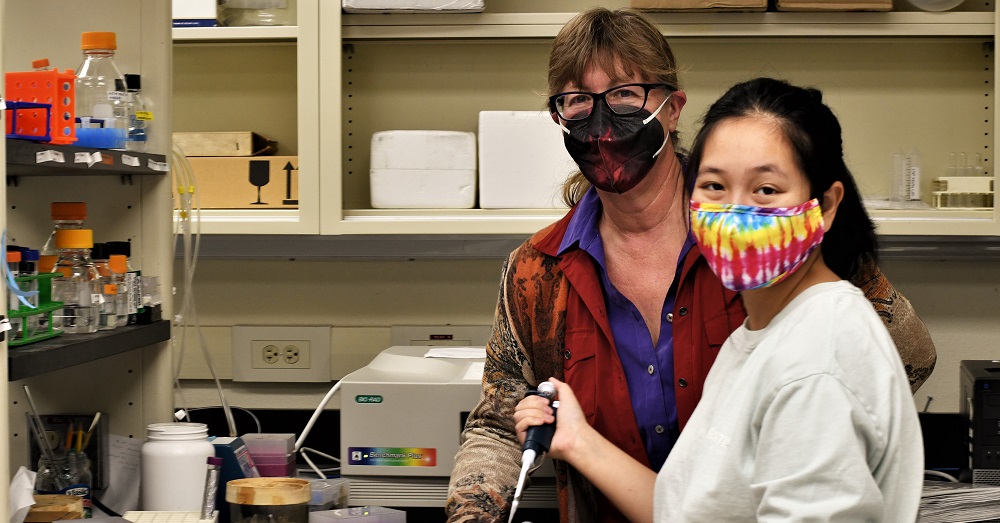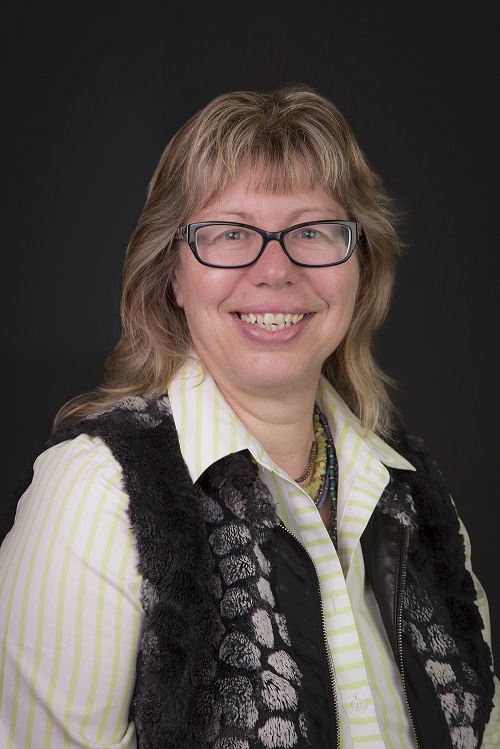TTUHSC’s Urbatsch Hosts 2023 Gordon Research Conference
Biennial Meeting Focused on Multidrug Efflux Systems Research

Ina Urbatsch, Ph.D., is a member of the TTUHSC School of Medicine’s Center for Membrane Protein Research
Ina Urbatsch, Ph.D., a professor in the Department of Cell Biology and Biochemistry at the Texas Tech University Health Sciences Center (TTUHSC) School of Medicine, hosted the 2023 Multidrug Efflux Systems Gordon Research Conference (GRC) March 26-31 in Galveston, Texas.
GRCs are a group of internationally organized scientific conferences, each focused on specific topics and technologies that represent the latest frontiers of research that cover the latest developments — some yet to be published — related to the biomedical sciences.
The Multi-Drug Efflux Systems GRCs are conducted every two years, though the 2021 event was canceled due to the pandemic. The theme of the 2023 meeting was “Targeting the Mechanisms and Regulation of Transporters for Advancing Health During a Pandemic,” and the conference program included a wide range of diverse speakers and discussion leaders representing institutions and organizations worldwide and concentrating on the latest developments in the field.
Urbatsch, a member of the TTUHSC School of Medicine’s Center for Membrane Protein Research, said Gordon Research Conferences are conducive to scientific interactions because they are relatively small (200 people maximum) and are focused on a specific topic.
“These scientific interactions are very intense interactions that really promote the bringing together of early career investigators with more established and senior researchers,” Urbatsch said. “I have sat next to a Nobel Prize laureate, discussing themes that came up in the morning session over lunch.”
Urbatsch said a major focus of the 2023 conference was the multifaceted mechanisms of multidrug efflux pumps (transporters) and how to harness them to develop better drugs.

Ina Urbatsch, Ph.D.
“Multidrug efflux pumps determine the lifetime of the drugs in the bloodstream, and they often control it,” Urbatsch added.
These multidrug transporters are located in the intestines where they limit absorption of dietary compounds and components. Others are located in the liver, where they enhance the excretion of toxic compounds and metabolites from the bloodstream.
For instance, when someone ingests a pill, that pill interacts with the multidrug transporters and is prevented from entering the intestine so that it is never absorbed. For those administered intravenously, multidrug transporters in the liver will excrete the drugs after filtering them out of the blood.
“We also have transporters like that in tumor cells, and if the drugs are recognized by these transporters, they are kicked out of the tumor cells, and then they are kicked out through the liver and the concentration of the drug just goes down to the point where it is no longer effective,” Urbatsch explained.
Another issue the Multidrug Efflux Systems GRC sought to address is the mechanisms of resistance that lead to rejection and often leave the patient without options if relapse occurs. For example, the first time a patient receives treatment for breast cancer, the treatment may kill 99.999% of all the cancer cells, but for some unknown reason a very tiny population of the cells are resistant to the treatment. After treatment ends, these cells may return, multiply and expand, sending the patient into relapse five to 10 years down the road.
“When it returns, all of the cancer cells are resistant because they have this mechanism or mechanisms for resistance that was present in the small population that wasn't killed,” Urbatsch said. “And usually they are not just resistant against the drug that was originally used for treatment, but they are resistant to a whole variety of drugs. That leaves the patient with very few treatment options at relapse, and it's due to these transporters that are overexpressed at the cell surface. They recognize the drugs and they kick them out, so if we can find a way to block the transporters without interfering with the drug, you could sensitize the patient again to treatment.”
Urbatsch said her research focuses on understanding exactly how the drugs interact with the transporter to find ways of modifying the drugs and chemistry background such that the drugs are no longer recognized.
“They evade those transporters and become more effective,” Urbatsch said. “They live longer, and then they have a higher therapeutic index and may also provide new treatment options to relapsed patients.”
Urbatsch said it is important to note that the 2023 Multi-Drug Efflux Systems GRC brought together researchers from two traditionally isolated fields: those whose research focuses upon eukaryotic transporters (located in the liver, gut and brain) and those focused upon the prokaryotic transporters (located in bacteria).
“The transporters in the bacteria are a little different, and they may use slightly different mechanisms,” Urbatsch said. “By bringing the two fields together, they can cross fertilize; whatever they learned in bacteria, we may be able to find an application in cancer research, and vice versa.”
Urbatsch has developed an extensive network of collaborators over the years through GRCs and other conferences. Several of those collaborators spoke at this Multidrug Efflux Systems GRC and presented their data, some of which is unpublished.
Bringing researchers together from across the world to find long-sought-after solutions to difficult issues is one of the things Urbatsch enjoys about GRCs. She ensured the 2023 Multidrug Efflux Systems GRC would have a global feel by inviting international researchers from Australia, Europe, India and Japan to join U.S. scientists from Texas, Pennsylvania, Oklahoma and Washington.
“We have a policy (at GRCs) of sharing unpublished results to really keep us at the forefront of science and to foster that unhindered exchange of new information,” Urbatsch said.
Related Stories
National Academy of Inventors Names TTUHSC Faculty Senior Members
The National Academy of Inventors (NAI) has designated two current and one former TTUHSC faculty researchers as Senior Members.
TTUHSC Cancer Researcher Honored by National Academy of Inventors
C. Patrick Reynolds, M.D., Ph.D., director of the School of Medicine Pediatric Cancer Research Center at TTUHSC, has dedicated his life as a researcher to developing treatments for childhood cancers.
TTUHSC’s Hudson Set to Serve as President for Society of Clinical Research Associates
The Society of Clinical Research Associates (SOCRA) has elected Texas Tech University Health Sciences Center’s (TTUHSC) Catherine Hudson, Dr.P.H., as its president for 2025-2026.
Recent Stories
National Academy of Inventors Names TTUHSC Faculty Senior Members
The National Academy of Inventors (NAI) has designated two current and one former TTUHSC faculty researchers as Senior Members.
The John Wayne Cancer Foundation Surgical Oncology Fellowship Program at Texas Tech University Health Sciences Center Announced
TTUHSC is collaborating with the John Wayne Cancer Foundation and has established the Big Cure Endowment, which supports the university’s efforts to reduce cancer incidence and increase survivability of people in rural and underserved areas.
TTUHSC Receives $1 Million Gift from Amarillo National Bank to Expand and Enhance Pediatric Care in the Panhandle
TTUHSC School of Medicine leaders accepted a $1 million philanthropic gift from Amarillo National Bank on Tuesday (Feb. 10), marking a transformational investment in pediatric care for the Texas Panhandle.
